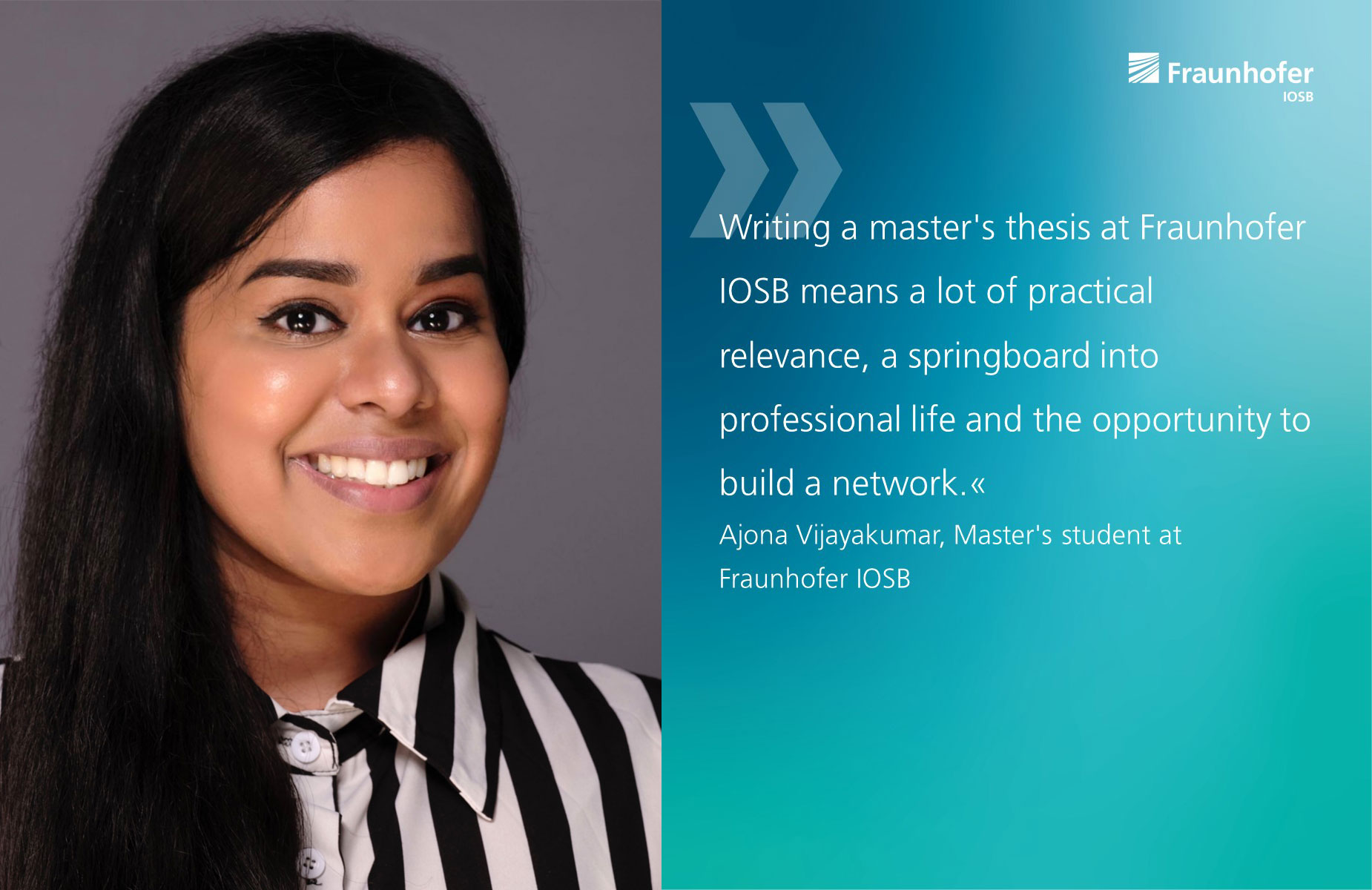
What is it like to write a master's thesis at Fraunhofer IOSB?

Whether you are a pupil, student or graduate, Fraunhofer IOSB supports talented individuals in a range of fields and at different stages of their education. In particular, master's students have the opportunity to write their thesis in collaboration with Fraunhofer IOSB and immerse themselves in the practical work of applied research.
Contrary to popular belief, it doesn't always have to be purely technical. In the Perceptual User Interfaces (PUI) project group in the Human AI Interaction (HAI) department, prospective psychologists are conducting research into human-machine interaction in automated driving.
Ajona Vijayakumar is one of them. As a prospective psychologist, she has decided to do her master's thesis at Fraunhofer IOSB. In the following interview, she explains how she came to do a master's thesis in psychology at our institute, what she has experienced during this time, and what advice she has for those who are undecided.
You are studying for a master's degree in psychology at the Catholic University of Eichstätt. Why did you decide to do your master's thesis at the Fraunhofer IOSB in Karlsruhe?
Fraunhofer IOSB is a renowned institute for applied research. Research here is conducted in close collaboration with the industry. I have always found it very exciting to combine theory with practice. When it came to looking for a topic for my master's thesis, it soon became clear to me that I wanted to find a scientific solution to a real-world problem.
My later supervisor, Dr. Frederik Diederichs, was an external lecturer for the Human Factors and Ergonomics module at my university at the time. It was through him that I became aware of the possibility of writing theses at Fraunhofer IOSB and, in particular, in his Perceptual User Interfaces group. I contacted him afterwards and then everything happened very quickly. In a video call, he presented me with various research topics that might fit my thematic orientation. And they were an absolute match! With the option of working remotely, I joined Fraunhofer IOSB as a master's student in November 2022.
And which topic have you chosen?
From the topics, I decided to develop a new method for the KARLI project. The new method should be used to find out how to use an existing technology, in our case the Advanced Occupant Monitoring System (AOMS), to identify use cases. My work was not only involving experts, but also users. The method should prove that it is at least as good, if not better, than expert interviews in terms of budget and time. In the context of the KARLI project, only the technology and the problem of motion sickness (MS) were specified. Developing a specific research question and method was therefore challenging.
In short: it was a lot of practice! We have the technology on one side and the question of how we can develop use cases that help occupants avoid motion sickness as cost-effectively and efficiently as possible on the other side.
What did you appreciate about your time at Fraunhofer IOSB?
I always had competent contacts and support in my supervisor Frederik Diederichs and the PUI group. This was particularly helpful to me in finding the right topic for me. He also gave me the opportunity to work on the joint research project KARLI in a student assistant job. This not only gave me valuable insights into research topics related to autonomous driving, but also allowed me to participate in project meetings and follow and help shape the course of the project. My personal highlight was the opportunity to attend the project's mid-term presentation in Frankfurt, where the participating companies presented their interim results. Before I started my master's thesis, I had no idea what else awaited me. Not only did I graduate, but I also gained real insight into the research fields and practical applications. I am very grateful for that!
How did you deal with challenges during your master's thesis?
As much as I liked the freedom in the topic and research processes, such freedoms naturally also involve some effort. You get fewer guidelines for the research question and in the organization, so a lot of self-discipline and self-organization is required. It was therefore challenging to arrive at a specific research question and method. But I was never alone in this – I had the opportunity to address and clarify my questions up until the writing process in a weekly meeting with my supervisor. This was a great support for me and, in retrospect, it was precisely this challenge that proved to be a valuable experience for my subsequent career entry.
What advice do you give students who are undecided or want to write their master's thesis at Fraunhofer IOSB?
Stay open and dare to do it! Writing a master's thesis at Fraunhofer IOSB means a lot of practical experience, a springboard into professional life and the opportunity to build a network. You will learn to work in a team, to approach challenges with self-discipline and creativity. If this is exactly what you are looking for, then you are in the right place here and especially in the PUI group. Approach the task with an open mind, bring a little self-discipline with you and you are sure to get support here.
The interview was conducted by Kathleen Entz.
 Fraunhofer Institute of Optronics, System Technologies and Image Exploitation IOSB
Fraunhofer Institute of Optronics, System Technologies and Image Exploitation IOSB